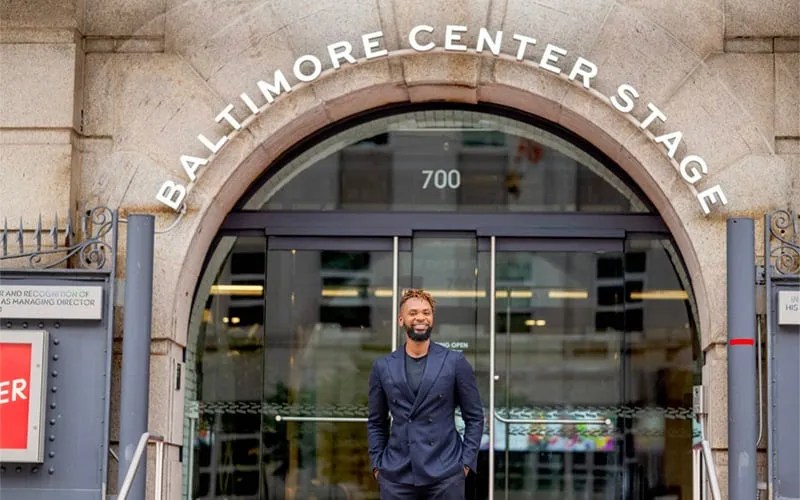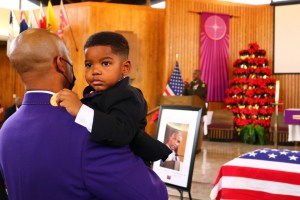In the realm of theater, there are those rare individuals who not only excel in their craft but also harness the power of the stage to drive social change. Obie Award winner Stevie Walker-Webb, the newly appointed artistic director of Baltimore’s Center Stage, is one such luminary.
In a candid and intimate conversation, we explored his early journey in theater, his deep-rooted commitment to social justice, and his ambitious plans for shaping the future of Baltimore theater.
With an impressive bio and body of work, Walker-Webb is described as a survivor of poverty and the associative violence that comes with growing up black and poor in America. Amongst many accolades he is a fellow at New York Theatre Workshop and recipient of the Princess Grace Award for Theatre.
The Tony Award nominee has served as the founding artistic director of the Jubilee Theatre and has created art and Theatre in Madagascar, South Africa, Mexico and across America. He’s worked as the outreach coordinator for Theatre of the Oppressed-NYC and holds an MFA from The New School, and a B.S. in Sociology from the University of North Texas. His work has been produced by The Public Theatre, American Civil Liberties Union, Cherry Lane, Zara Aina, La Mama, The New Group, Wooly Mammoth and The Baltimore Center Stage, making his newest steps on this journey, full circle.
On Oct. 1 he became artistic director of Baltimore Center Stage.

As our conversation began, it is obvious that Walker -Webb absolutely loves what he does. His love affair with the theater commenced in Waco, Texas, where he grew up in a low-income household, with his mother, father, and six siblings. He vividly recalls those formative years, where he became the director, playwright, and chief orchestrator of family plays that not only entertained– but also allowed him to channel his boundless imagination. It was within these humble beginnings that Walker-Webb says he discovered the transformative potential of theater, firmly believing that the magic of make-believe could transcend reality.
As he transitioned into his early adulthood, Webb continued to hone his theatrical talents by directing plays for church events and organizing community theater projects with friends. At the age of 21, he embarked on his most significant endeavor, founding the Jubilee Theater. This groundbreaking project was a response to the dearth of accessible arts opportunities for Black and Brown communities in his neighborhood. Webb’s visionary spirit shone through as he set out to create a space where underrepresented voices could thrive.
When questioned about the skills and experiences he intends to bring to The Baltimore Center Stage, Webb emphasized the importance of representation and inclusivity. He shared his belief that the theater should resonate with its audience, providing plays and shows that people want to see repeatedly because they see themselves reflected on stage.
“Wherever we are, it’s always going to be a little better,” he stated with conviction. “When we show up, we show out, and when we show out, things get better.”
Webb’s transformative work extends to his recent move to Baltimore as the artistic director of the Baltimore Center Stage. He spoke passionately about Baltimore’s unique cultural landscape and the city’s continued commitment to arts and culture. For him, this move is a profound opportunity to live within his purpose and contribute to the city’s vibrant artistic community.
When asked about the social causes close to his heart, Webb shared a deeply personal connection to the issue of police brutality. In 2013, he tragically lost a brother to this scourge. In response, he became involved in “Operation Conversation” a theater program in New York City that fosters positive relationships between inner-city teenagers and police officers. The program harnesses the power of performance, improvisation, and dialogue to humanize young people who are often unfairly viewed as suspects. It serves as a crucial bridge between communities and law enforcement, possibly preventing future tragedies.
In closing, Webb expressed his profound excitement about his new role in Baltimore. He eagerly anticipates collaborating with close friends and industry luminaries like Lee Daniels, Lena Waithe, and Jordan Cooper to bring fresh perspectives and diverse voices to Baltimore theater. His vision encompasses showcasing local talent and amplifying the narratives of power, success, and cultural enrichment that define Baltimore.
As Baltimore’s theater scene welcomes Stevie Walker- Webb, audiences can look forward to a future filled with innovation, inclusivity, and social impact. Webb’s journey, rooted in humble beginnings, is a testament to the transformative power of theater and the indomitable spirit of individuals dedicated to using their craft for the greater good.
If you’re wondering, I asked! Stevie Walker-Webb is not single, he is in a new relationship with Baltimore and is married to Center Stage! He’s committed to fostering new relationships with our existing cultural institutions, our artists and bringing to us productions that we’ll want to see again and again.
Baltimore Center Stage is poised for a new era of creativity and inspiration under Webb’s visionary leadership.
The post Transforming lives and theater: An intimate conversation with Baltimore center stage’s new artistic director Stevie Walker- Webb appeared first on AFRO American Newspapers .











